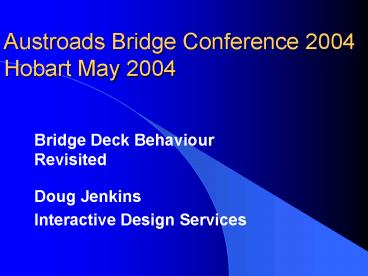Training PowerPoint PPT Presentation
Title: Training
1
Austroads Bridge Conference 2004Hobart May 2004
Bridge Deck Behaviour Revisited Doug
Jenkins Interactive Design Services
2
Overview
- Changes in computing technology
- Illustration dynamic analysis animation
- Features of alternative analysis methods
- Hamblys comments on FE analysis
- Summary of findings in paper
- Examples of advanced analysis techniques
- Conclusions
- Copy of presenation www.interactiveds.com.au
3
Changes in Computing Technology
- 1976
- Text based punched card input
- 200 nodes grillage
- Linear static analysis
- Printed text output
- 2004
- Interactive graphical input
- 100,000 nodes 3D brick elements
- Non-linear and dynamic analysis
- Interactive, animated graphical output
4
ftp//download.intel.com/research/silicon/moorespa
per.pdf
5
Speed of Computer Systems Prof. E.L.
Wilsonhttp//www.csiberkeley.com/support_technica
l_papers.html
6
(No Transcript)
7
Animation
8
Hambly comments
- Powerful and versatile analytical ... with a
sufficiently large computer, - Often requested by clients, or proposed to a
client, - Cumbersome to use and is usually expensive.
- Choice of element type can be extremely critical
- Full time occupation which cannot be carried out
... by the senior engineer responsible for the
design. - Unlikely to have time to understand or verify ...
data. - Difficult to place his confidence in the results
9
Features of Analyses
10
Grillage 1a
11
Grillage 1b
12
Grillage 1c
13
Grillage 2
14
Grillage 2 - detail
15
Plate Slab with Downstand Beams
16
Brick Elements
17
Brick Elements - detail
18
(No Transcript)
19
(No Transcript)
20
(No Transcript)
21
Beam and Plate Analysis Deflected Shape
22
Beam and Plate Analysis Long. Stress
23
Brick Elements Long. Stress
24
Brick Elements Cutting Plane
25
Brick Elements Cutting Plane, Selected Element
26
Link Slab
27
(No Transcript)
28
Animation
29
Dynamic Analysis
30
Animation
31
Summary of findings in paperAdvantages
- Transverse distribution of live loads -
significantly reduce maximum design stresses in
longitudinal members. - Distribution of wheel loads - more accurate
estimate top slab bending moments, without the
need for introducing separate local analyses. - Analysis of secondary effects such as
differential temperature and shrinkage - Ends of skew decks and link slabs modelled more
exactly, including three dimensional effects.
32
Summary of findings in paperNo Longer a Problem
- Finite element models may now be produced and
analysed using standard computing equipment in a
shorter time than a grillage analysis would have
taken in the recent past. - The accuracy of complex models may be checked
against grillage analysis, or individual elements
may be checked against simple analysis methods. - Three dimensional contour plots of stresses or
plots of the deformed shape of structures are
easily produced, allowing engineers not directly
involved in the analysis to review the results,
and check the validity of the model.
33
Summary of findings in paperDisadvantages
- More difficult to extract member actions,
particularly for large elements such as bridge
beams. - Design engineers must be trained in the use of
complex software to use it efficiently. - Verification process may be more difficult,
particularly if detailed analysis has resulted in
lower design actions than a simpler analysis.
34
Review Hambly comments
- Powerful and versatile analytical ... with a
sufficiently large computer, - Often requested by clients, or proposed to a
client, - Cumbersome to use and is usually expensive.
- Choice of element type can be extremely critical
- Full time occupation which cannot be carried out
... by the senior engineer responsible for the
design. - Unlikely to have time to understand or verify ...
data. - Difficult to place his confidence in the results
35
Recommendations
- Standard analysis procedure- Plate slab model
with longitudinal beam members - Use pre and post-processor software, specifically
designed for bridge decks. - Use brick models to further refine the design, or
to investigate the behaviour of non-standard
features. - Consider the use of non-linear analysis and slab
membrane action - potential for significant
refinement of deck slab design.

